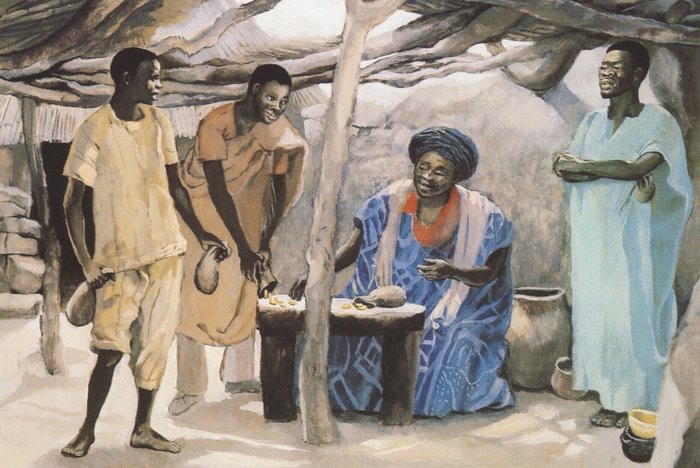Revised Common Lectionary Reflection, Twenty-Fourth Sunday after Pentecost, Proper 28, Year A
November 15, 2020

Lessons: Zephaniah 1:7-12, 12-18; Psalm 90:1-8 (9-11), 12; 1 Thessalonians 5:1-11; Matthew 25:14-30
Theme: God’s faithful and generous people operate from Jesus’ principle of abundance and enter into the joy of Jesus with all they’ve got and every fiber of their being.
Key Scripture: “For to all those who have, more will be given, and they will have an abundance; but from those who have nothing, even what they have will be taken away.” – Matthew 25:29
Oh, these problematic parables of Jesus! The longer one looks at them, ponders them, and teaches them, the more complex and compelling they become. A master teacher, Jesus draws us in to the narrative, leaves us to figure out the social, political, and religious contexts (both first century and present day), and, if we are honest with ourselves, will not let us settle for simple and easy answers.
I’ve read, studied, and preached this parable for years and have become increasingly uncomfortable with it. Yes, I’ve been guilty of seeing this story through the lens of my privilege and dominant culture. Perhaps you have, too. It’s all too easy to apply a “bootstraps mentality” to this lesson. After all, what does the master say in verse 29? “For to all those who have, more will be given, and they will have an abundance; but from those who have nothing, even what they have will be taken away.”
Shouldn’t we all be the model slaves who took the master’s money and risked to invest and multiply it? Isn’t that what good folks in a capitalistic system are expected to do? Some people might even go so far as to call the third slave a loser who deserves the master’s wrath. Even if we look at “talents” as our faith and discipleship walk, we get the same kind of result: The first two slaves are good disciples, while the third slave is, well, a loser who deserves what he gets for not being “all-in.”
What if, however, Jesus is up to something completely different? Could this be a critique of the economic, social, religious, and political systems of his day (and ours)? What if we broadened our approach to this and other parables to see Jesus’ teachings in new light? How about we take some hermeneutical risks with it for the sake of the gospel?
Timing: Jesus enters Jerusalem in triumph on a young donkey way back in chapter 21. Now he’s confronting the religious leaders of his day before taking on the powers of empire in a most unexpected way. One more teaching about sheep and goats remains before Jesus is arrested in the very next chapter. There is a sense of urgency and absurdity in these final parables; they don’t make sense from the center. To find the gospel, one would do well to move to the margins and puzzle out the complexity and ruthlessness of first century life under occupation.

Context: Life under Roman occupation was brutal and unjust. Even the religious leaders of the day are caught up in this system, making religious practice burdensome for the poor while trying to keep right practice afloat. Jesus critiques the religious practitioners and practices of his day, even going so far as to run all signs of commerce out of the temple. Why, then, would we accept a face-value reading of this story? And why would we even consider assigning the Christ to the role of the master when the master’s behaviors are most un-Christ-like and not supported by what we read elsewhere in scripture and prophecy? The short answer, of course, is that in our dualistic world there have to be winners and losers, and we reward winners even if they had an enormous head start and the stakes aren’t fair. It’s comfortable to see the world this way. If we look too hard or step out of the box, then we risk opening ourselves to uncomfortable truths that require a response.
Motivation: What if the third slave has it right? The master is a harsh man. The slave fears messing up and losing the master’s possession—a possibility that would end badly for the slave. In fact, from his perspective the slave can’t, and risk is not in his playbook, so he refuses to participate. What kind of master gives his resources to slaves expecting a big return on investment? That just reeks of exploitation and injustice, of which there is plenty both then and now. For example, think of how today’s essential workers paid far below a living wage are continuing to keep the wheels of capitalistic consumerism rolling during this time of pandemic. Where’s the justice there?

Wondering whether you dare preach an alternative understanding of this parable in your context? Perhaps just raising a question or two is enough. Maybe all you need to do is shed the light on the possibilities of Jesus doing a new thing here. However you approach it, avoid using this parable as your annual stewardship lesson. Guilt and shame never work as long-term motivators for positive change, especially where time, talent, and treasure are involved. The joy of Jesus and the table around which we gather is open to all people, regardless of the return on investment. The gospel is all about abundance, love, mercy, and grace, and we are invited to share in this and to share it prodigally. Now that’s some good news indeed!
In
Worship
With COVID-19 spiking in many places, some congregations may
be returning to fully online worship. Consider having a dramatic reading of the
gospel for several voices. Invite worshipers to locate themselves within the
story. Who are they? Who would they most like to be? Who would they least like
to be? Where do they see Christ operating in this story? How might we rewrite
this story for our day?
What would an alternative reading of this parable bring to your community? What exactly is the joy of the Lord as opposed to the joy of the master? Consider using one of these two worship songs: “The Joy of the Lord,” by the Rend Collective or “The Joy of the Lord” by Audrey Assad.
With
Youth
“Therefore encourage one another and build up each other, as indeed you are
doing” (1 Thessalonians 5:11).
This week’s epistle lesson encourages us to live in the present moment, to be aware and pay attention. The day of the Lord is coming, but we have no clue when that will be. Our charge is to go on living as God’s beloved people, dressed in faith and love. Our hope is in Jesus, and our work is to encourage one another and build up each other.
It’s so easy to be torn down in this world. Bullies, culture, societal expectations often bring us down and cause us to take our eyes off Jesus. That’s why we need the Body of Christ, the church, and one another to stay strong in the faith and keep pressing onward.
Invite youth to come up with a list of ways they can build one another up. Give each youth a copy of the list and ask them to report in as they work the list and embrace the call the to support each other. Commit to pray for each youth by name every day if you are not already doing so.
With Children
This week’s focus verse is 1 Thessalonians 5:11: – Therefore encourage one another and build up each other, as indeed you are doing.
Do you ever feel down or sad? Does it help when someone comes along and has just the right words or a smile? The Apostle Paul, who wrote this letter to the church in Thessalonica, knew a thing or two about challenges. He’d been shipwrecked, beaten, put in prison, and faced all kinds of trials. Even so, he’s thinking about his friends in Thessalonica and encouraging them to build up one another. He would tell us the same thing today.
You have great power to encourage others—a hug (perhaps a socially distant air hug right now), a smile, a kind word, a drawing or note. All of these things can be a big encouragement to other people, and right now I think we can all use a little encouragement. In tough times, it’s easy to forget that we are deeply loved by Jesus, so I want to remind you today of that very thing. Don’t ever forget how much Jesus loves you. In fact, let’s sing “Jesus Loves Me” together.
This week look around for people who need encouragement and offer them some. Jesus loves you and everybody else, and this is very good news.
Finish with a simple echo prayer and blessing.
Dear God (Dear God),
Thank you (Thank you) for loving us (for loving us) and teaching us to love and care for others (and teaching us to love and care for others). Help us to be encouragers (Help us to be encouragers) and to lift others up. (and to lift others up). Keep us from fear (Keep us from fear). Keep us hopeful (Keep us hopeful). Make us helpful (Make us helpful). Give us peace (Give us peace). Amen (Amen).
Weekly
Stewardship Bulletin Insert
Jesus invites us to be all-in as stewards of the mysteries
of faith. Parables can be confusing and ponderous, but hidden within each
teaching is a precious jewel of understanding that can draw us closer of our
Lord and help us to understand God’s desire for all creation.
Stewardship at Home
Interested in learning more about how our economic system impacts essential workers and those working in service roles? Check out Barbara Ehrenreich’s book Nickled and Dimed: On (not) Getting by in America. Here’s a link to a PDF of the book.
Gather with family and friends, if possible, to discuss the book. Have you ever worked for the kind of wages Ehrenreich describes? Do you know the feeling of having “more month than money”? Have you ever experienced homelessness or had to go through the daunting process of applying for assistance? If not, do you know someone who has had these experiences? What can you learn from them? What changes in the economic system might need to happen for all to be able to make a living wage? Are there parallels dovetail between Ehrenreich’s book and the gospel lesson this week?
2017 Reflection: https://www.stewardshipoflife.org/2017/11/encourage-edify-and-live-in-the-light/
2014 Reflection: https://www.stewardshipoflife.org/2014/11/talent-show/
Note: Reprint rights granted to congregations and other church organizations for local, nonprofit use. Just include this note: “Copyright (c) 2020, Rev. Sharron Blezard. Used by Permission.” Other uses, please inquire: thewritelife@hotmail.com.



Leave a Reply